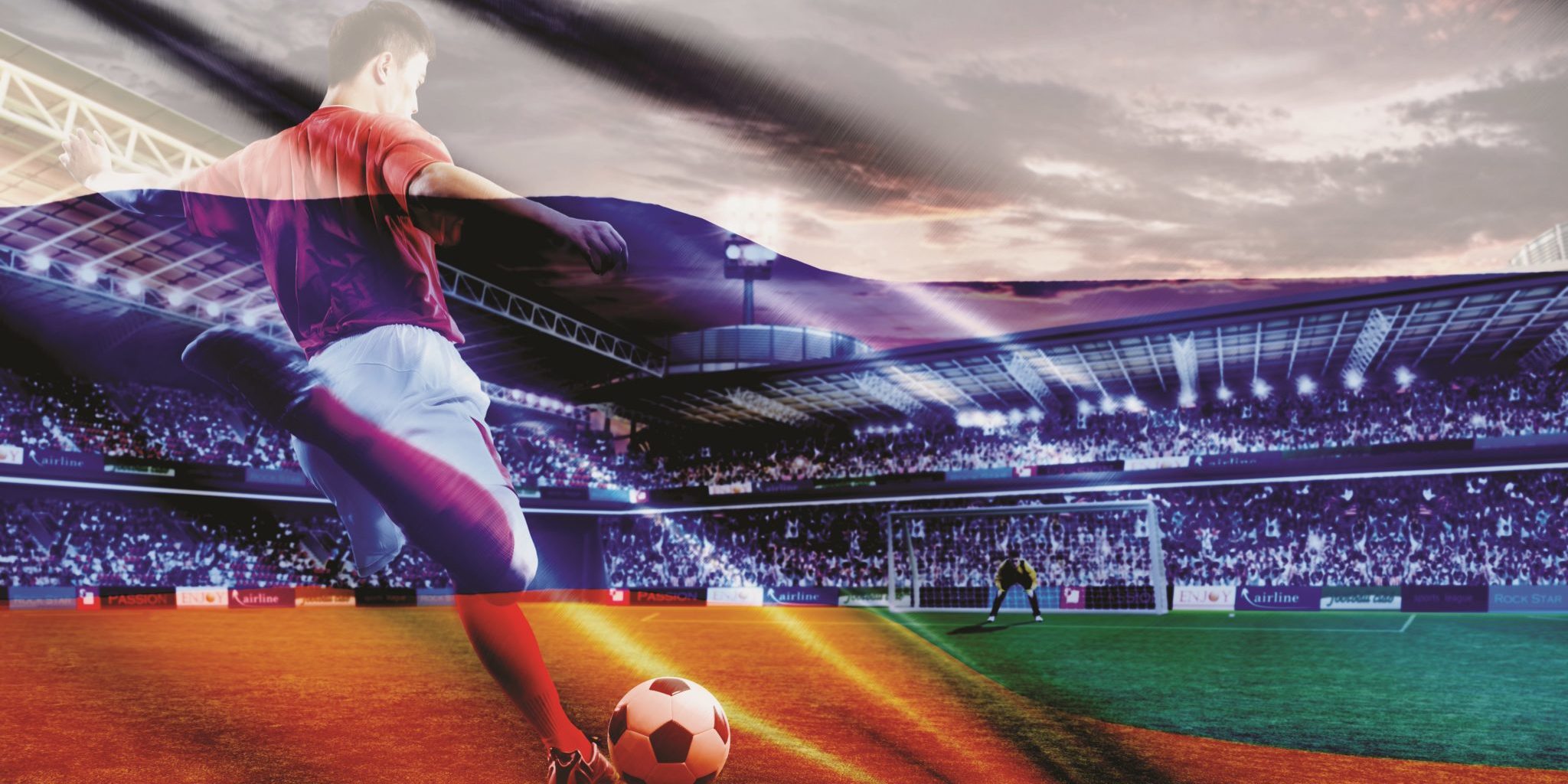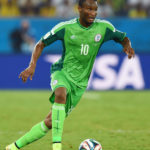Not only is the Football World Cup the most watched sporting event in the world, it is also among the most lucrative. It makes more money than any other sporting spectacle apart from the Olympic Games and attracts more eyeballs than anything else on the small screen.
The 2014 World Cup reached almost half the global population of 7 billion people, according to a report released by FIFA and Kantar Media. In-home television audiences were reported at 3.2 billion people, with the final viewed by a billion people – and everything about the World Cup just keeps super-sizing.
In 2026, 48 teams will compete at the World Cup, 16 more than the current field of 32; 80 matches will be played, 18 more than the current 64; and revenue will skyrocket with FIFA’s early calculations suggesting a more than $700 million hike in profits.
While those eye-popping numbers can be ogled at and analyzed over the next nine years, for this year’s tournament FIFA have continued the trend of increasing the prize money for the World Cup, which has happened for the last five editions. In 2018, rewards have increased by 40%.
A total of $400 million will be shared among the 32 participating teams, with each team set to finish with a minimum of $9.5 million ($1.5 million in preparation fee and $8 million for a group stage exit). The winners will take home $38 million.
Loading...
That’s a lot of many to dish out for an organization that spent a significant time between May 2015 and February 2016 muddling through a massive corruption scandal, which resulted in 18 people and two corporations being indicted and a complete change of the guard.
Sepp Blatter’s 17-year reign at FIFA was ended when he was slapped with an eight-year ban (since reduced to six years) for an unethical offering of a cash gift and conflicts of interest. He was replaced in an interim capacity by Cameroon’s Issa Hayatou, who served president of the Confederation of African Football for 29 years and was initially accused of accepting a bribe, a charge he denied. In fact, no-one involved in the scandal was African, though a payment of $10 million from Danny Jordaan – president of the South African Football Association – to FIFA, which was then sent on to Jack Warner, head of the Confederation of North, Central American and Caribbean Association, apparently intended as developmental support, was key in Warner’s downfall. Jordaan escaped unscathed.
Hayatou was never intended to be a long-term appointment and handed over to Gianni Infantino in 2016. At 46 years old, Infantino became the youngest FIFA president since the Second World War, but has yet to properly win the hearts or minds of the football-following public.
A survey endorsed by Transparency International in March last year, 12 months after Infantino took over, revealed that 53% of the 25,000 fans who responded to the questionnaire do not have confidence in FIFA as an organization, while 98% of people claimed to still be concerned about corruption. More tellingly, for the purposes of this story and the tournament that will take place in June, 43% of people disapproved of Russia as hosts for the World Cup.
Some of that sentiment stems from the process of allocating World Cup hosts, which was investigated and shown to be questionable, some of had come from Russia’s involvement in the Ukraine and the third group of nay-sayers would have been those appalled by the history of racism in the Russian game, something that remains of particular concern for African players. Feelings aside, on June 14 the first whistle will blow and the tournament will kick off.
FIFA will hope the flagship event will take some of the focus off a turbulent last few years and pave the way for a more transparent and inclusive future. Here is a complete guide to what the organization is hoping can be forgotten, how the World Cup will be funded and what the African continent can hope to achieve from sport’s greatest showpiece.
Financial Losses and Forecasts
The effects of the scandal that dogged FIFA through most of 2015 were largely financial. An article published by The Economist in June 2017, revealed that FIFA lost three times more money in 2016 than in 2015 – $369 million – and were forecasting an even greater deficit in 2017, of $489 million. But in March 2018, FIFA’s annual report revealed losses of only $191.5 million in 2017, leading to the organization declaring itself as having had a “successful year for all key financial parameters”. Still, FIFA’s reserves, which had been above $1 billion since 2008, dipped.
Not all of the loss was due to the scandal; it was also attributed to more funding for members and changes to the accounting system. Legal bills more than doubled, from $20 million in 2015 to $50 million in 2016, and FIFA invested in a museum which cost $190 million, which added to their total costs.
FIFA anticipates a smoother financial road in its next four-year cycle and expects to earn $6.65 billion between 2019 and 2022 inclusive. It also plans to raise payouts to member associations in that time, with each to receive $1.5 million, an increase of $250,000 and FIFA hopes to end the 2022 World Cup with reserves of $1.9 billion.
“I am very pleased to see that Fifa is able to deliver on its promises,” Infantino said. “We had committed to restoring trust in the organization and boosting investments for the development of football worldwide. This is now a reality.”
Sponsorship
A major consequence of the corruption scandal was the loss of sponsors, which make up a significant portion of World Cup revenue. Big name companies such as Sony, Emirates, Castrol and Johnson & Johnson opted not to renew their contracts. By June last year, FIFA had only secured 12 sponsors out of 34 for the World Cup and only one of them was Russian, Moscow’s Alfa-Bank. “With one year to go, this situation is unheard of,” Michael Payne, a former marketing chief for the International Olympic Committee told The Economist at the time.
Since then, FIFA have lined up several more firms, many of them Chinese. Wanda, a private-property developer, electronics company HiSense, smartphone maker Vivo, dairy company Mengniu, and electric vehicle firm Yadea, were all signed on by February as Chinese interest in FIFA grows.
“Mengniu is one of the biggest dairy producers in the world and is a strong brand in the Chinese market. Growing the game worldwide is one of our key priorities, and we now have another strong official sponsor in such an important region,” FIFA’s commercial manager Philippe Le Floc’h said when the dairy company signed off.
China’s interest in FIFA is particularly intriguing because of the country’s interest in hosting the World Cup. Chinese president Xi Jinping met with Infantino last June and a statement released by FIFA said Jinping had “expressed his hope, and the dream of many Chinese people, that the country would have the opportunity to host a FIFA Men’s World Cup at some stage in the future.”
Though China has not made any official statements about bidding for a tournament, speculation is high that they are interested in either the 2030 or 2034 edition.
Meanwhile, Qatar Airways have replaced Emirates until 2022, the year in which the World Cup will be held in Qatar.
Africa’s Big Five
This year, the continent will be represented by three North African and two West African teams, but current Africa Cup of Nations (AFCON) champions Cameroon are not among them. Neither are any teams from the east or south of the continent, which largely stems from the professional experience of players from these regions. North and West African players often gain experience in European leagues, especially France, while players in the east and south are less likely to find deals abroad.
Big things will be expected from the five nations, especially as no African team has progressed beyond the quarterfinals of a World Cup. A final four finish will be considered a major triumph as the continent continues to dream of its first world champions.
On paper, Tunisia enter the tournament as the best hope. They are the highest-ranked side of the continent, 23rd overall, and have not been at the World Cup since 2006. They have never got past the group stage but with players like Youssef Msakni, who scored a hat-trick against Guinea during qualification and has netted 14 times in 51 international appearances, that could change. The challenge begins early, with their opening match to be played against England, something coach Nabil Maâloul believes will be a true test of character against players from what he calls “the best league in the world.”
For nostalgic reasons, Senegal may be the team considered most likely to break into the semi-finals. They are still regarded as darlings of Africa after they stole hearts with their surge to the 2002 quarterfinals, in their maiden World Cup. They have not been to the tournament since and may not have made it to this one but for a case of match-fixing in the qualifiers, which allowed them to replay a match against South Africa. Their coach, Aliou Cissé, was the captain in 2002, so he will be coming full circle for this event. Their hopes will rest on Sadio Mane, who was the most expensive African transfer when he was bought by Liverpool for $48.2 million on a five-year deal in 2016.
Morocco are Africa’s third-side, ranked 42nd, and have not been to the World Cup since 1998. Their coach Hervé Renard has overseen two successful AFCON campaigns, with Zambia in 2012 and Ivory Coast in 2015. Morocco’s strength is their defence, after they finished unbeaten during the qualifiers without conceding a single goal. Their captain, Medhi Benatia, is regarded as the most accomplished member of their squad. He plays for Italian giants Juventus and Morocco will need his experience in a tough group that includes Spain and Portugal.
Egypt have been away from the global game longest, having last played in a World Cup in 1990. Since then, everything about Egypt has changed, with the Arab Spring having profound effects on society and sport. The football league was cancelled for two seasons between 2011 and 2013 and the game suffered tremendously. Despite being seven-time AFCON champions, Egypt failed to qualify for the 2012, 2013 and 2015 editions of the tournament and have also never won a World Cup game. Now, they can change that. In their squad is the veteran goalkeeper Essam El-Hadary, who is 44 years old and will play in his first World Cup, and 25-year-old Liverpool forward Mohamed Salah, who has been compared to Lionel Messi and Cristiano Ronaldo recently. He has scored 32 goals in 56 internationals, including five during World Cup qualifying, the joint-highest in the campaign.
Lowest ranked among the African sides at 52nd overall, but perhaps with the highest expectation, is Nigeria, who are making their third successive World Cup appearance and seventh overall. They were the first African team to qualify for the World Cup, a surprise considering they missed out on the last two AFCONs. They have a strong squad which includes John Obi Mikel, a Chelsea stalwart who has since moved to China, Chelsea’s Victor Moses and 21-year-old striker Kelechi Iheanacho, who played for Manchester City before moving to Leicester City. Nigeria have been drawn with Argentina for the fifth time at a World Cup and that will be their key clash on the field. Off the field, Nigeria have long had problems between the players and the football federation surrounding bonuses around World Cups. An agreement on a pay structure was reached late last year.
- Youssef Msakni, Tunisia. Photograph proveded.
- Sadio Mane, Senegal. Photo provided.
- John Obi Mikel, Nigeria. Photograph provided.
- Essam Kamal Tawfik El-Hadary, Egypt. Photograph provided
- Medhi Benatia, Morocco. Photograph provided.
Racism
There is a danger, however, that the performances of Africa’s teams will be affected by the reception they receive in the tournament’s host nation. Russia is the country in which African footballers have faced the most brazen forms of racism. In 2015, anti-discrimination group Fare revealed research of over 100 incidents of racist behavior in Russian football over two seasons and high-profile players, including Ivorian superstar Yaya Touré and Cameroon’s Samuel Eto’o, have complained about being on the receiving end of monkey chants. Touré has even offered his assistance to World Cup organizers to prevent the abuse continuing.
“I have been abused by racism and because those things happened to me, I try to be involved and I want to help those people who don’t have a voice to control this situation,” Toure said. “For me to defend an African boy in this situation is a blessing. What we are looking to do is to try and stop those idiotic people doing that. We have to be focused and have fair play everywhere.”
Touré’s help has not been taken up but Russia has appointed an anti-racism official Alexei Tolkachev, who admitted to The New York Times in 2015 that as young man, he participated in monkey chants, like many compatriots of the same age. “They do it because it was done before and because they don’t know any better,” he said. While Tolkachev advocated for greater education, he also shrugged off the problem, even though FIFA have indicated they will take it seriously.
Infantino has given referees the power to stop or even abandon matches if discriminatory incidents take place and recent evidence suggest that could well be the case. In January this year, Russian club Spartak Moscow posted a video on Twitter of three of its own Brazilian players, Luiz Adriano, Pedro Rocha and Fernando in training in the United Arab Emirates with the words, “See how chocolates melt in the sun.” The tweet was deleted but not before anti-discrimination group Fare condemned the club for showing, “a shocking level of ignorance.” The players involved, who are all black, later denied that any racism existed in Russian football.
Kick off
Despite myriad concerns facing the World Cup, it will go ahead and though there is much to discuss and debate, there is also much to look forward to.
For the first time, video assistant referees will be used at a World Cup, showing a move to embrace technology in decision making. In total, 100,000 jobs have been created and 30,000 volunteers will be used. Russia expects over a million visitors as fans from around the world make their way to the tournament, three million to fill the stadiums and more than three billion to watch on television. The numbers are staggering and only confirm that no matter what happens behind the scenes, the World Cup remains an all-encompassing global spectacle.
Let’s hope Egypt, Morocco, Nigeria, Senegal and Tunisia make Africa proud.
– By Firdose Moonda
Loading...





